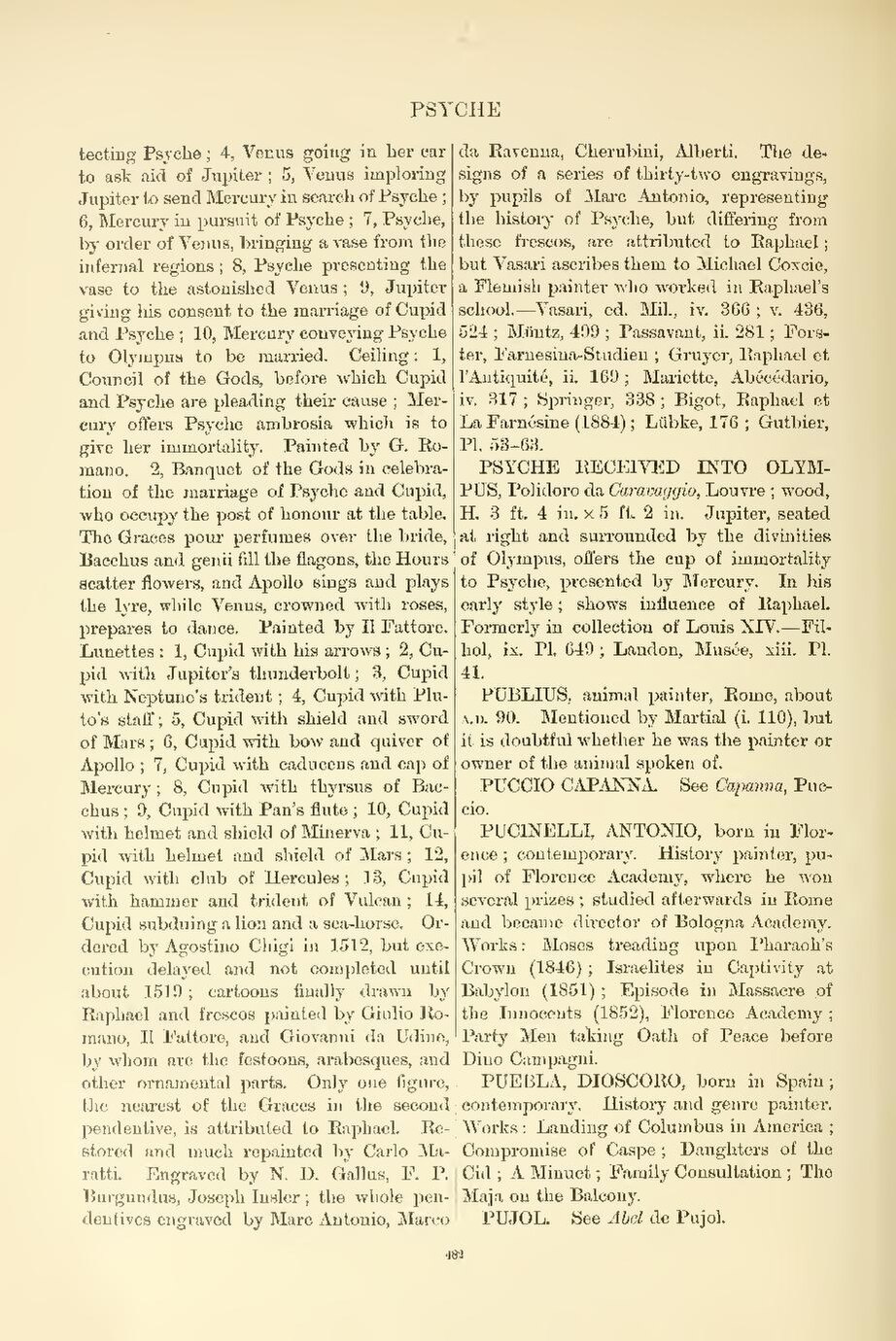- tecting Psyche; 4, Venus going in her car
to ask aid of Jupiter; 5, Venus imploring Jupiter to send Mercury in search of Psyche; 6, Mercury in pursuit of Psyche; 7, Psyche, by order of Venus, bringing a vase from the infernal regions; 8, Psyche presenting the vase to the astonished Venus; 9, Jupiter giving his consent to the marriage of Cupid and Psyche; 10, Mercury conveying Psyche to Olympus to be married. Ceiling: 1, Council of the Gods, before which Cupid and Psyche are pleading their cause; Mercury offers Psyche ambrosia which is to give her immortality. Painted by G. Romano. 2, Banquet of the Gods in celebration of the marriage of Psyche and Cupid, who occupy the post of honour at the table. The Graces pour perfumes over the bride, Bacchus and genii fill the flagons, the Hours scatter flowers, and Apollo sings and plays the lyre, while Venus, crowned with roses, prepares to dance. Painted by Il Fattore. Lunettes: 1, Cupid with his arrows; 2, Cupid with Jupiter's thunderbolt; 3, Cupid with Neptune's trident; 4, Cupid with Pluto's staff; 5, Cupid with shield and sword of Mars; 6, Cupid with bow and quiver of Apollo; 7, Cupid with caduceus and cap of Mercury; 8, Cupid with thyrsus of Bacchus; 9, Cupid with Pan's flute; 10, Cupid with helmet and shield of Minerva; 11, Cupid with helmet and shield of Mars; 12, Cupid with club of Hercules; 13, Cupid with hammer and trident of Vulcan; 14, Cupid subduing a lion and a sea-horse. Ordered by Agostino Chigi in 1512, but execution delayed and not completed until about 1519; cartoons finally drawn by Raphael and frescos painted by Giulio Romano, Il Fattore, and Giovanni da Udine, by whom are the festoons, arabesques, and other ornamental parts. Only one figure, the nearest of the Graces in the second pendentive, is attributed to Raphael. Restored and much repainted by Carlo Maratti. Engraved by N. D. Gallus, F. P. Burgundus, Joseph Insler; the whole pendentives engraved by Marc Antonio, Marco da Ravenna, Cherubini, Alberti. The designs of a series of thirty-two engravings, by pupils of Marc Antonio, representing the history of Psyche, but differing from these frescos, are attributed to Raphael; but Vasari ascribes them to Michael Coxcie, a Flemish painter who worked in Raphael's school.—Vasari, ed. Mil., iv. 366; v. 436, 524; Müntz, 499; Passavant, ii. 281; Forster, Farnesina-Studien; Gruyer, Raphael et l'Antiquité, ii. 169; Mariette, Abécédario, iv. 317; Springer, 338; Bigot, Raphael et La Farnésine (1884); Lübke, 176; Gutbier, Pl. 53-63.
PSYCHE RECEIVED INTO OLYMPUS,
Polidoro da Caravaggio, Louvre; wood,
H. 3 ft. 4 in. × 5 ft. 2 in. Jupiter, seated
at right and surrounded by the divinities
of Olympus, offers the cup of immortality
to Psyche, presented by Mercury. In his
early style; shows influence of Raphael.
Formerly in collection of Louis XIV.—Filhol,
ix. Pl. 649; Landon, Musée, xiii. Pl.
41.
PUBLIUS, animal painter, Rome, about
A.D. 90. Mentioned by Martial (i. 110), but
it is doubtful whether he was the painter or
owner of the animal spoken of.
PUCCIO CAPANNA. See Capanna, Puccio.
PUCINELLI, ANTONIO, born in Florence;
contemporary. History painter, pupil
of Florence Academy, where he won
several prizes; studied afterwards in Rome
and became director of Bologna Academy.
Works: Moses treading upon Pharaoh's
Crown (1846); Israelites in Captivity at
Babylon (1851); Episode in Massacre of
the Innocents (1852), Florence Academy;
Party Men taking Oath of Peace before
Dino Campagni.
PUEBLA, DIOSCORO, born in Spain;
contemporary. History and genre painter.
Works: Landing of Columbus in America;
Compromise of Caspe; Daughters of the
Cid; A Minuet; Family Consultation; The
Maja on the Balcony.
PUJOL. See Abel de Pujol.
